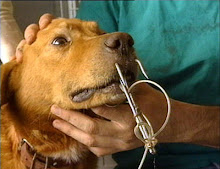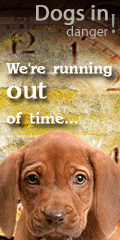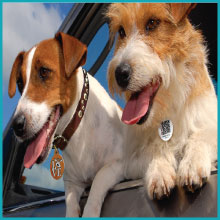Nation's Largest Pet Insurer Reveals the Sources of Pet Poisoning
Pet owners often joke about pets being like vacuum cleaners literally eating anything put in front of them. Unfortunately, that lack of dietary discretion too often results in pets ingesting toxic substances, emergency visits to the veterinarian, and large medical bills. Veterinary Pet Insurance Co. (VPI), the nation's oldest and largest provider of pet health insurance, has analyzed its database of more than 485,000 insured pets to find the sources behind the hundreds of poisoning claims submitted to VPI every month. Following is a ranking of the nearly 20,000 pet poisoning claims VPI received between 2005 and 2009:
Accidental Ingestion of Medications (pet or human drugs)
5,131
Rodenticide (mouse & rat poison)
4,028
Methylxanthine Toxicity (chocolate, caffeine)
3,661
Plant Poisoning
2,808
Household Chemicals
1,669
Metaldehyde (snail, slug poison)
396
Insecticide
323
Heavy Metal Toxicity (lead, zinc)
288
Toad Poisoning
270
Antifreeze Poisoning
213
Walnut Poisoning
100
Alcohol Toxicity
75
Strychnine
28
VPI policyholders spent more than $6.6 million between 2005 and 2009 treating their pets for poisoning. Accidental ingestion of pet or human medications, the most common type of poisoning, cost policyholders an average of $791 per claim. The most expensive type of poisoning, heavy metal poisoning, cost an average of $952 per claim.
"Not only can a poisoning incident be life-threatening for the pet, it's traumatic for the pet owner as well," said Dr. Carol McConnell, vice president and chief veterinary medical officer for VPI. "Depending on what substance the pet has ingested and the amount, the reaction can be sudden with the animal exhibiting alarming symptoms such as staggering, vomiting, drooling, seizures, and even loss of consciousness. We recommend that pet owners be aware of which items around their homes can be harmful to their pets – medications, insect poisons, chocolate, and certain nuts – and keep these items safely out of reach. Also, they shouldn't assume that their pets will ignore that bottle of bleach in the laundry room or the Philodendron plant by the window. Our data shows this just isn't so."
In addition to taking steps to avoid poisoning emergencies, pet owners should be prepared for such an emergency should it arise. For example, owners should keep the phone number of their pets' regular veterinarian and a phone number for an emergency veterinary hospital handy at all times. For more information about pet poisoning prevention and poisoning first-aid, please visit the Pet Poison Helpline at www.petpoisonhelpline.com.
About Veterinary Pet Insurance
With more than 485,000 pets insured nationwide, Veterinary Pet Insurance Co./DVM Insurance Agency is the No. 1 veterinarian-recommended pet health insurance company and is a member of the Nationwide Insurance family of companies. Providing pet owners with peace of mind since 1982, the company is committed to being the trusted choice of America's pet lovers and an advocate of pet health education. VPI Pet Insurance plans cover dogs, cats, birds and exotic pets for multiple medical problems and conditions relating to accidents, illnesses and injuries. Optional Pet CareGuard® for routine care is also available.
Medical plans are available in all 50 states and the District of Columbia. More than 2,000 companies nationwide offer VPI Pet Insurance as an employee benefit. Policies are underwritten by Veterinary Pet Insurance Company in California and in all other states by National Casualty Company, an A+15 rated company in Madison, Wisconsin. Pet owners can find VPI Pet Insurance on Facebook or follow @VPI on Twitter. For more information about VPI Pet Insurance, call 800-USA-PETS (800-872-7387) or visit www.petinsurance.com.
Monday, July 26, 2010
Subscribe to:
Post Comments (Atom)

















2 comments:
Great post! i like it , so interesting
Great post! I hope you will share more with us. Thank you!
Ana
Post a Comment